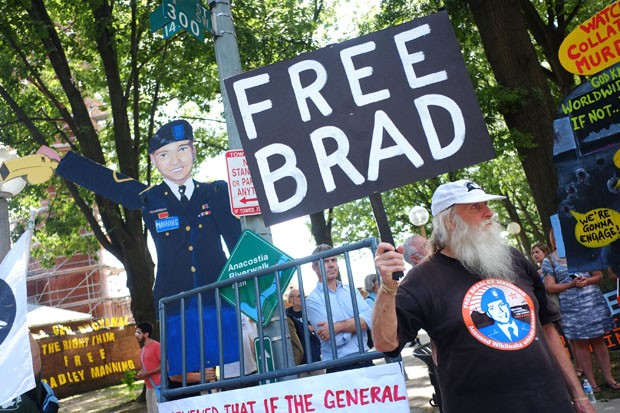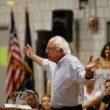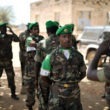(Protesters at Fort McNair | Source: US News & World Report)
It’s stunning how a simple traffic advisory can be transformed into a subliminal screed about security and safety. But perhaps not surprising.
For months, the Bradley Manning and Edward Snowden affairs have been debated in blogs, the mainstream news and editorial pages, TV and radio talk shows, and Congress.
On one side are those who fear for the fate of privacy, investigative reporting, an unfettered press, the fairness of the American justice system (both civil and military), and even democracy.
On the other side are those who simply fear.
| On one side are those who fear for the fate of privacy, investigative reporting, an unfettered press, the fairness of the justice system, and even democracy. On the other side are those who simply fear. |
They pillory Manning and Snowden (and all national security whistleblowers) for endangering them, along with the protestors, who, by association, are potentially dangerous.
To date, it seems the fearists have won the war for the public’s hearts and minds.
Last week, a Bradley Manning support group announced it would protest his case at Washington D.C.’s Ft. McNair on July 26, which houses the office of Major General Jeffrey Buchanan, who oversees Manning’s trial.
To warn his southwest D.C. constituents of “potential traffic snarls” due to the protest and a baseball game at the nearby Nationals’ stadium, Andy Litsky, the elected head of a Washington neighborhood advisory commission, wrote to his constituents on July 25.
In the brief note, Litsky suggests that protestors can be dangerous.
He wrote that, “300 demonstrators are expected, and unless they pose an immediate security threat to the installation or halt operations, they are free to exercise their right to free speech.”
What largesse!
He was obviously unaware of the hundreds of protests across the U.S. against Manning’s imprisonment and later, his trial, none of which ever threatened security or halted operations.
Interestingly, he added that Ft. McNair’s gate would be closed, to “prevent potential co-mingling of military personnel with protestors” (emphasis added). Was this Litsky’s or the Army’s concern?
For both, the nation’s military must be protected from protestors.
Moreover, to avoid possible interactions, Litsky noted the Fort’s residents and employees were directed to use a different entrance during the protest. (When the demonstrators moved to that entrance, guards soon shut the gate).
Finally, Litsky assured his constituents that an office in the Fort is “working closely” with D.C. police to “ensure the safety and security of residents in the area.”
Litsky and others see Manning, Snowden and their supporters as threats to national security, instead of the authorities’ deepening threat to free speech, justice and assembly.
Such a sorry time in U.S. history.
Barbara Koeppel lives in Washington, D.C.







0 Comments